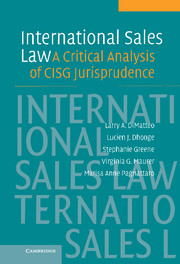Book contents
- Frontmatter
- Contents
- Preface
- Acknowledgments
- 1 INTRODUCTION
- 2 CISG METHODOLOGY AND JURISPRUDENCE
- 3 FORMATION: WRITING REQUIREMENTS
- 4 FORMATION: OFFER AND ACCEPTANCE RULES
- 5 OBLIGATIONS OF BUYERS
- 6 OBLIGATIONS OF SELLERS
- 7 COMMON OBLIGATIONS OF BUYERS AND SELLERS
- 8 BREACH OF CONTRACT BY SELLER
- 9 BREACH OF CONTRACT BY BUYER
- 10 DAMAGES, EXCUSE, AND PRESERVATION
- 11 SUMMARY AND OBSERVATIONS
- TABLE OF AUTHORITIES AND CASES
- APPENDIX A: UNITED NATIONS CONVENTION ON CONTRACTS FOR THE INTERNATIONAL SALE OF GOODS (CISG) (APRIL 11, 1980)
- APPENDIX B: CISG: TABLE OF CONTRACTING STATES (AS OF FEBRUARY 8, 2005)
- Index
6 - OBLIGATIONS OF SELLERS
Published online by Cambridge University Press: 06 August 2009
- Frontmatter
- Contents
- Preface
- Acknowledgments
- 1 INTRODUCTION
- 2 CISG METHODOLOGY AND JURISPRUDENCE
- 3 FORMATION: WRITING REQUIREMENTS
- 4 FORMATION: OFFER AND ACCEPTANCE RULES
- 5 OBLIGATIONS OF BUYERS
- 6 OBLIGATIONS OF SELLERS
- 7 COMMON OBLIGATIONS OF BUYERS AND SELLERS
- 8 BREACH OF CONTRACT BY SELLER
- 9 BREACH OF CONTRACT BY BUYER
- 10 DAMAGES, EXCUSE, AND PRESERVATION
- 11 SUMMARY AND OBSERVATIONS
- TABLE OF AUTHORITIES AND CASES
- APPENDIX A: UNITED NATIONS CONVENTION ON CONTRACTS FOR THE INTERNATIONAL SALE OF GOODS (CISG) (APRIL 11, 1980)
- APPENDIX B: CISG: TABLE OF CONTRACTING STATES (AS OF FEBRUARY 8, 2005)
- Index
Summary
This chapter focuses on the duties of sellers in the CISG-governed transaction. The seller has the basic duty, of course, to attend to timely delivery of conforming goods and documents, free of the unexpected claims of third parties. This chapter analyzes the issues associated with the delivery of goods and the handing over of documents and the conformity of the goods and third-party claims. It reviews how courts and arbitral panels have interpreted the CISG obligations of the seller.
THE DUTY OF DELIVERY
The CISG requires the seller to “deliver the goods, hand over any documents relating to them and transfer the property in the goods, as required by the contract.” The CISG specifies the seller's obligations with respect to the place for delivery, arranging for the carriage of goods and their insurance, the time of delivery, and the time and place at which documents are to be handed over. These obligations are set forth in Articles 30–34.
As noted in Chapter 2, an underlying (implied) principle of the CISG is the continuance of the contractual relationship. Some commentators have noted that Article 30 contains “the beginnings of an obligation to cooperate.” The Article 30 obligation is general and references the actual agreement of the parties and the particulars of national law. It “states the obvious,” that the seller must deliver the goods, a principle of sales law that is near universal, for “there is no sale without delivery and transfer of property.”
- Type
- Chapter
- Information
- International Sales LawA Critical Analysis of CISG Jurisprudence, pp. 101 - 120Publisher: Cambridge University PressPrint publication year: 2005

